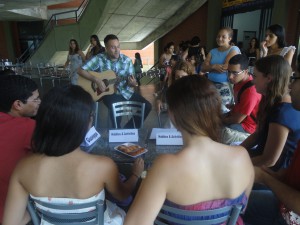
Giuseppe Cespedes, 2011-2012, Fulbright ETA to Brazil (left, with guitar), on his first visit to the Universidade Estadual de Santa Cruz, playing music to his then future students, having a casual conversation (in his initially limited Portuguese), and enjoying some delicious Brazilian pastries
When you are applying for Fulbright U.S. Student Program grant, remember that Fulbright is not solely about assistant teaching English or about doing research; you need to dig deeper. Fulbright was my community in Pontal, a small beach town in the city of Ilhéus, Brazil. It was the place where I made my first group of Brazilian friends, where I learned how to dance forró, and where I practiced capoeira. As a Fulbright English Teaching Assistant, Fulbright placed me at the forefront of my first English class at Universidade Estadual de Santa Cruz, a state university where students from all across the state of Bahia came to attend. My students, pushed by their curiosity, unabashedly asked me questions about my life and my perspectives on Brazilian culture. I tried my best to answer with my limited Portuguese. I was teaching while being taught. My students were my most encouraging Portuguese teachers, and the more we learned from each other, the closer we became as a group.
My students weren’t always the most confident English speakers, so I thought to incorporate music into the classroom to ease the tension. It started off with simple classroom activities, but it quickly spawned into a small choir of dedicated students with different levels of English. The choir met outside of class hours, performed at one of our campus-wide presentations, and we even recorded a few songs at the university recording studio. The choir wasn’t anything fancy or professional, but the students took to it and – if only for a moment – they sang without being consumed by self-awareness of their pronunciation.
Fulbright made me appreciate my own uniqueness, and it brought me into another culture I would have never otherwise experienced. If you want to be tourist, there are several ways to travel, but if you want to grow within a community, then Fulbright might be for you.
Whether you decide to apply for a Fulbright grant through your current academic institution or “At-Large,” you should take time to review the information provided for prospective applicants on the Fulbright website. Make sure to thoroughly read over the “Application Components” for the grant type that interests you the most. Look under the “Countries” tab, and you will be able to look up the requirements and expectations of a particular grant for each country.
When you’re ready for some professional assistance, use the built-in search tool on the website to find the Fulbright Program Adviser (FPA) at your institution of higher education (i.e., the person appointed by the Dean or President of an institution of higher education to recruit students for and assist students in the application process for Fulbright grants). An FPA should be able to provide you with guidance and support throughout your application process. If you are applying “At-Large,” contact the FPA from your last academic institution because they still may be able to assist you as alum. I was able to apply for a Fulbright English Teaching Assistantship though my alma mater, even though I had already graduated and was then serving a full-time AmeriCorps term. At that point, I didn’t know much about Fulbright, but what I had heard about it piqued my interest enough to set up an appointment with the designated FPA at Rutgers University. He talked me through the program details, and soon afterwards, appointed me with a mentor to assist me with my application. I recount this story not to generalize the process – because everyone’s experience will most likely be different – but to encourage you to make your first step official. No FPA at your institution? No problem. Contact the Fulbright U.S. Student Program staff at the Institute of International Education. Good luck!

4 Comments
Dear Giuseppe, You’re an amazing and unique person!!! After I read your article, and how you decided to apply for a Fullbright program, the only thing that I can say is that you’re an inspiration to me and to other that are willing to take the same step and learn more just going around the world. The most amazing part of all, it’s the dedication, and the passion that you always do, for every single thing that you do in your life; especially in Bahia, Brazil. I’m almost done getting my Associate Degree in a Bergen Community College, and I’m planning to transfer it to a State University and have my Bachelor Degree, and I’ll most definitly apply for this program. Thank you so much for all you do for the community around the world and for teaching us an important value. Best Regards, Ingri Cespedes
Thank you for sharing such a unique experience with me, Giuseppe! Time to take the first step!
I am studying Msc of civil engineering in Swinburne university of technology.
Can I become one of the fulbright scholar for PHD in relation my failed in the future?
Haider,
Please visit http://www.eca.state.gov/fulbright for more information about apply for a Fulbright grant. Good luck!